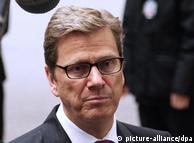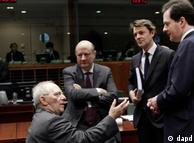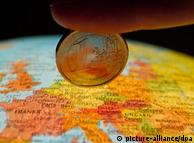EUROPEAN UNION | 30.01.2012
EU summit reveals high tensions and mixed priorities
A summit of European Union leaders began in Brussels on Monday afternoon, as they struggle to reconcile the continent's desperate need for economic growth with the proverbial call for austerity.
Economization, cost cutting, consolidation - that is Europe's motto these days, especially in countries such as Greece and Portugal. But this policy has also triggered social tension and unemployment, which is why EU leaders are meeting on Monday to discuss countermeasures.
German Finance Minister Wolfgang Schäuble said last Tuesday in Brussels that the focus would be on competitiveness "because all measures to boost finances also depend on the stable economic development in Europe and all member states."
Promoting competition
 Westerwelle does not want EU money squanderedThe EU wants to boost growth but not with good old stimulus packages, since that would add to the already accumulated debts. Tapping into EU funding pools like the regional and structural development fund and diverting some of this money could be a viable alternative.
Westerwelle does not want EU money squanderedThe EU wants to boost growth but not with good old stimulus packages, since that would add to the already accumulated debts. Tapping into EU funding pools like the regional and structural development fund and diverting some of this money could be a viable alternative.
German Foreign Minister Guido Westerwelle said in Brussels on Friday that it was also up to the EU Commission to take action along these lines. He argues that EU funds are being squandered anyway.
"I think it's wrong that money from the EU's structural development fund is being spent on bicycle stands in the country," he said. The funds should rather be used "to improve the competitiveness of weaker countries in Europe."
In his written summit invitation, EU President Herman Van Rompuy stressed the need to tackle youth unemployment and boost domestic markets, as well as increase support for small and medium-sized companies.
Mounting fears of a 'bottomless pit'
This official subject matter does not sound particularly controversial. However, it's likely that the most contentious issues will also be broached, albeit behind the scenes. One of these topics is the size of the eurozone's permanent bailout fund ESM (European Stability Mechanism), which is set to replace the temporary EFSF (European Financial Stability Facility).
Italian Prime Minister Mario Monti, International Monetary Fund head Christine Lagarde and the EU Commission are calling for an expansion of the fund, but Germany is putting on the brakes. Berlin wants to stick to the maximum lending capacity of 500 billion euros ($660.6 billion).
A visibly irritated Westerwelle said it was wrong to raise the prospect of new and constantly growing loans before the affected countries had done their homework. Otherwise the bailouts could stifle the incentive for reforms and open up a bottomless pit. He said Germany was merely calling on others do to their bit, no more and no less than the Germans themselves.
Germany is not alone with this stance, as the Austrian Finance Minister Maria Fekter pointed out on Tuesday. "It is very, very difficult to convince the parliaments of member states to inject more money yet again," she said. However, she thinks consensus may be achieved on the proposal of adding the untapped ESFS funds to the ESM.
 Schäuble says the fiscal pact is making good progressProgress toward a fiscal pact
Schäuble says the fiscal pact is making good progressProgress toward a fiscal pact
Germany is, however, satisfied with the progress toward the so-called fiscal pact. At the last summit in December, all EU states except Britain pledged to enforce more fiscal discipline. There will even be penalties for budget offenders, although the consequences will not be as severe as desired by Berlin.
It is possible that member states will already endorse the text of the fiscal pact at the summit on Monday. Further steps will likely take several months, but the overall process is going more smoothly than expected. This, combined with the ESM, means Europe is well prepared for the crisis, according to Schäuble.
"Solidarity and reliability are really coming together in this context. We are credibly addressing the problems in the affected countries by creating a structure for the European currency which will cement its reliability and efficiency. And in the meantime we have to demonstrate solidarity," he said.
Situation in Greece remains bleak
The issue of Greece still looms large, despite the fact that it has been omitted from the official summit agenda. It is more than likely that Greece will fail to qualify for a second rescue package. The Austrian finance minister stated openly what many think.
"The politicians in Greece must know that we expect more of them. It is not just about reducing costs - they must also get their act together and implement structural reforms," said Fekter. Meanwhile, negotiations with private creditors over a debt cut are making little headway. The most recent report by the troika will most likely not be completed in time for the summit.
Taxpayers footing the bill again?
 Greeks are not prepared to swallow more austerity measuresEuropean Monetary Affairs Commissioner Olli Rehn has repeatedly stressed that Greece will need more money from the euro states and EU institutions, the EFSF or the European Central Bank. Should the write-off by private creditors be insufficient, "public institutions will have to come to the rescue," according to IMF head Lagarde.
Greeks are not prepared to swallow more austerity measuresEuropean Monetary Affairs Commissioner Olli Rehn has repeatedly stressed that Greece will need more money from the euro states and EU institutions, the EFSF or the European Central Bank. Should the write-off by private creditors be insufficient, "public institutions will have to come to the rescue," according to IMF head Lagarde.
In an interview with Spiegel Online, Volker Kauder, the parliamentary leader of Germany's Christian Democrats, threatened Greece with the external appointment of a state commissioner, tasked with monitoring the country's budgetary policy. With such heated statements, the summit will have little choice but to address the issue of Greece.
Author: Christoph Hasselbach / nk
Editor: Nicole Goebel
Editor: Nicole Goebel

Comments